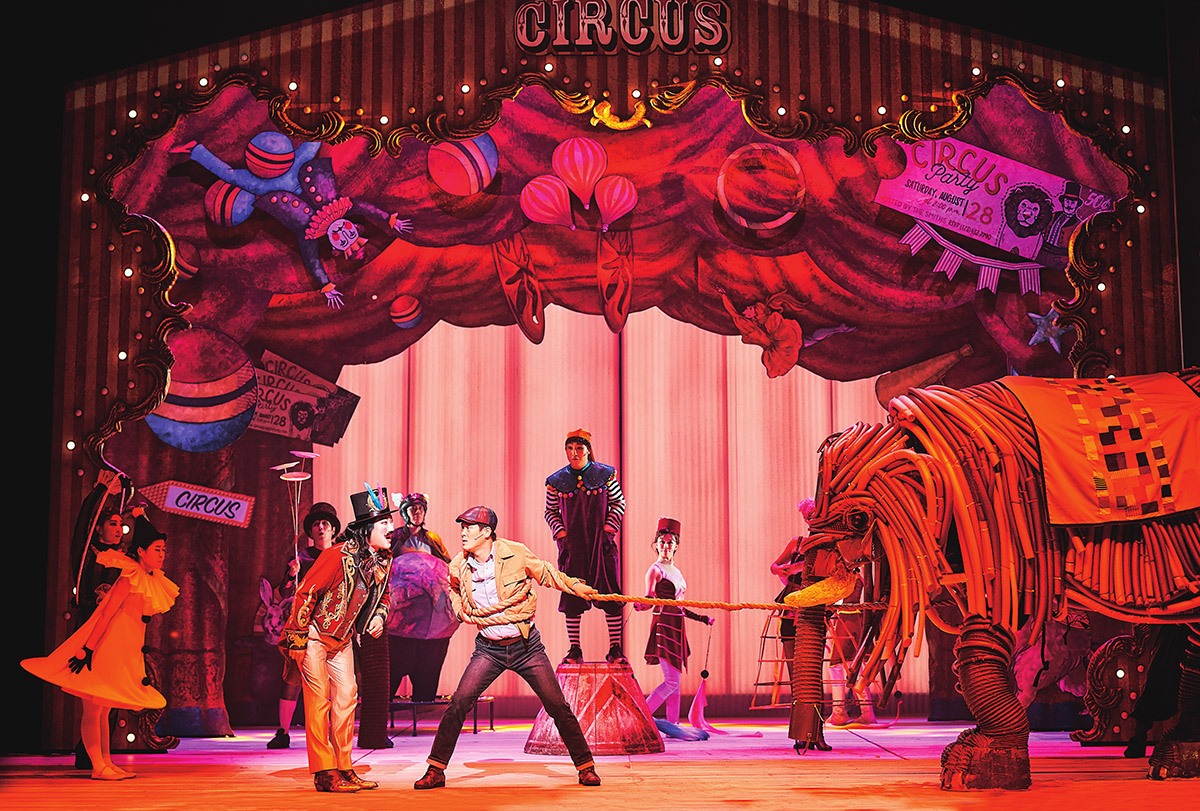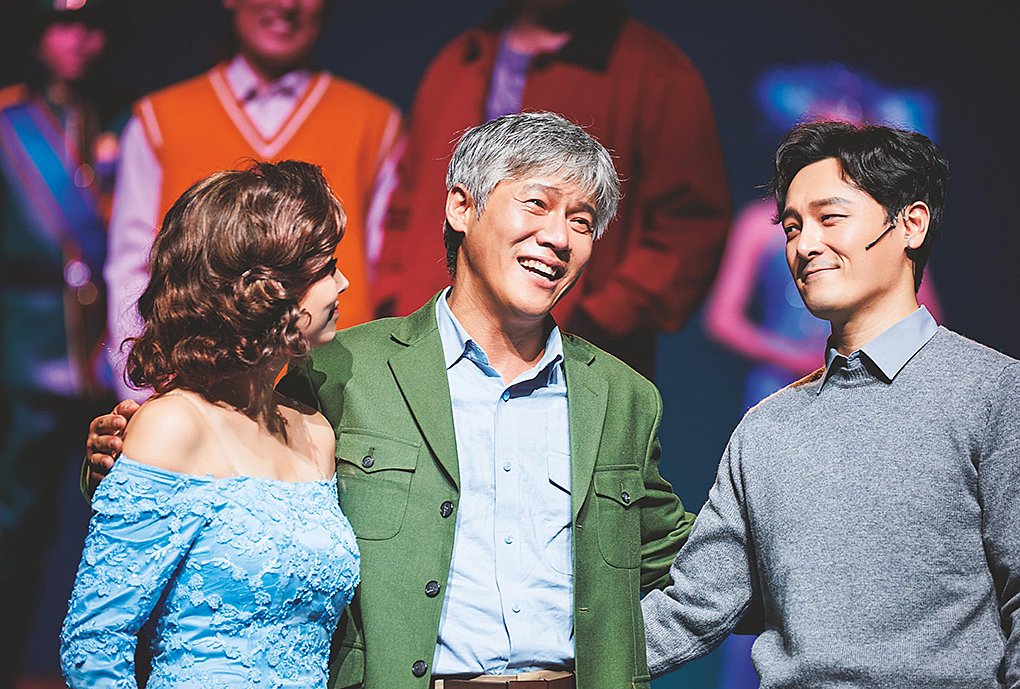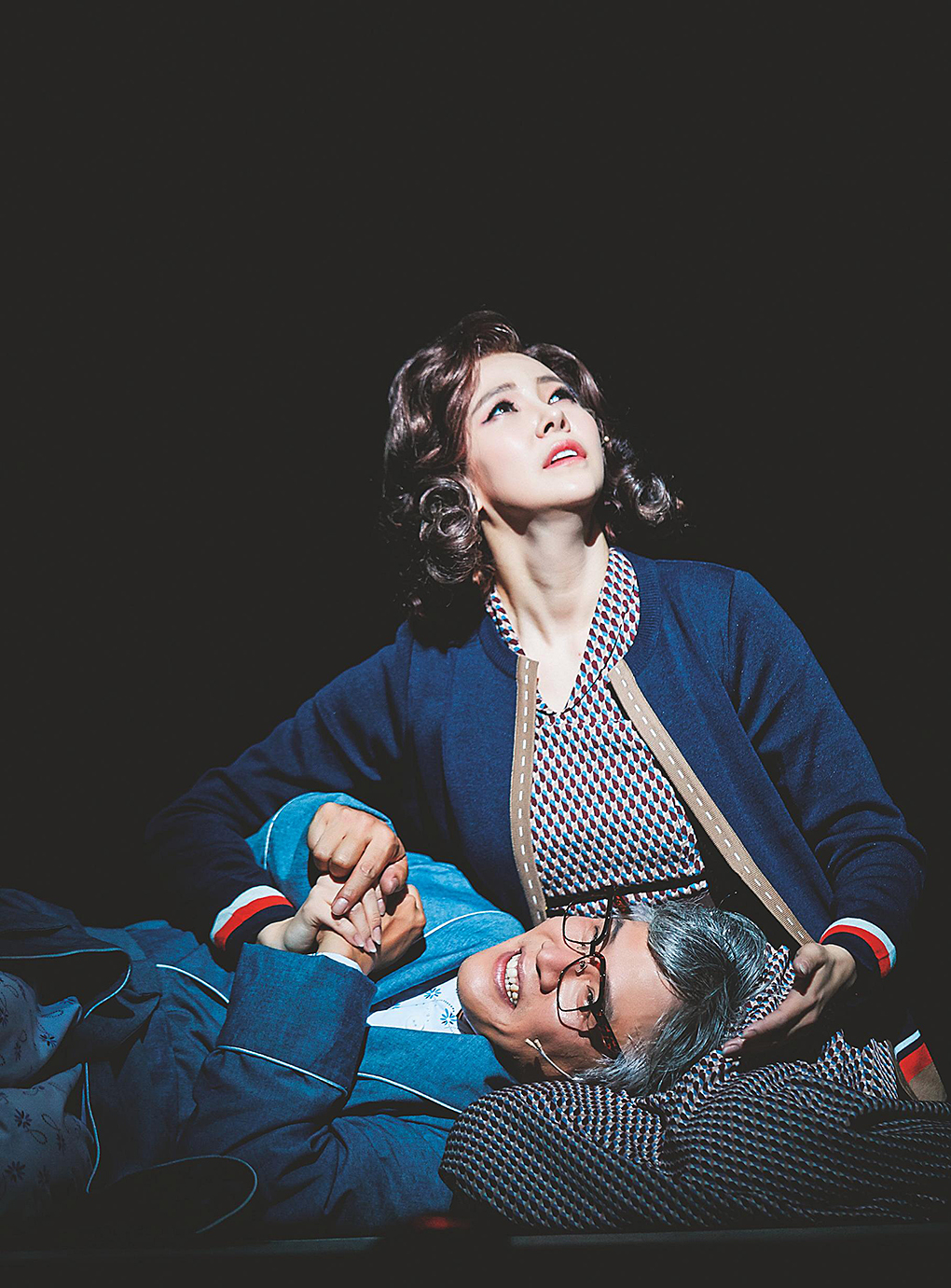Six years after its Broadway debut in 2013, “Big Fish,” a musical adaptation of Tim Burton’s fantasy drama film by the same name, hit the stage in Korea. A CJ ENM production, the show adroitly incorporated new ideas, resulting in heart-warmingperformances that resonated with the audience.

“Big Fish” staged at the SeoulArts Center’s CJ Towol Theaterfrom December 2019 toFebruary 2020 was entertainingin a uniquely Korean production,different from Broadwayor West End shows. © LORGNETTE
Tickets to musicals generally cost a lot more than tickets for movies or plays. The higher financial burden may be one reason why theater-goers don’t want to make the wrong choice, and so they do their research first, checking the buzz, the media, critics’ reviews and friends’ recommendations. Jukebox musicals featuring old-time hit songs or “movicals” (movie-to-musical adaptations) are popular precisely because they are safe bets, guaranteed to be entertaining and of a certain standard.
“Billy Elliot,” “Moulin Rouge,” “King Kong” and “Kinky Boots,” among other movies, have all been turned into hit musicals. These productions are at the height of their fame on New York’s Broadway and at London’s West End theaters, the places-to-be for global hit musicals.
It is hard for movicals not to be attractive when their stories, previously told on a flat screen, come to life on stage. Movie companies who own the film rights can also benefit as new energy is breathed into existing content, maximizing added value.

The lead character Edward Bloom (played byPark Ho-san), his wife Sandra (played by Kim Ji-woo) andtheir son Will (played by Lee Chang-yong) share a happymoment together.
From Screen to Stage
“Big Fish,” which opened in Seoul toward the end of 2019, is a typical movical. The 2003 fantasy film it is based on, directed by Tim Burton, was itself an adaption of a novel by Daniel Wallace published in 1998. Burton’s movies play out in versatile ways as they traverse stage and screen, characterized by fabulous colors, fanciful images and grotesque motifs. His classic 1990 film “Edward Scissorhands” was made into a musical by Matthew Bourne, and the 2005 fantasy “Charlie and the Chocolate Factory” was similarly adapted for the stage by Marc Shaiman. More recently, the hit musical “Beetlejuice” premiered on Broadway in the summer of 2019, adapted from the comedy film dating back to 1988.
There is even a word – Burtonesque – to describe the unique quality of Tim Burton’s movies. “Big Fish” is certainly deserving of the label. The story travels through the past and present, passing back and forth between reality and imagination. The director’s personal history is also reflected within; Burton lost his father around the time the movie was made. The son’s pathos in the film, expressed in his longing for his father and his eventual acceptance of his father’s tall tales, were all related to the director’s personal situation.
Ten years later, “Big Fish” was staged as a musical for the first time. Writer John August, who had participated in Disney’s “Aladdin,” wrote the script, and Andrew Lippa, Tony Award nominee for “The Addams Family,” wrote the music. Susan Stroman, five-time Tony Award winner and recipient of two Laurence Olivier Awards, was director and choreographer.
After a tryout at Chicago’s Oriental Theater, “Big Fish” premiered on Broadway at the Neil Simon Theatre. As is often the case with movicals, this version of “Big Fish” did not simply transplant the movie onto the stage. All kinds of experiments and alterations were attempted, referring back to the book from which the film had been adapted. It was a huge challenge to maximize the elements that could both entertain and be accommodated on stage. After the show closed on Broadway, it was staged in Sydney and London in 2017, where it was a popular draw.
The show presents a visualspectacle of objects thatreproduce on stage thefantasy previously executedin the book and movie.It follows other foreignlicensed musicals producedin Korea in terms ofartistry and pitch-perfectlocalization.
Novel Attractions

Edward and Sandra are deep in conversation. TheKorean production of “Big Fish” was acclaimed for itsmagnificent visual elements and wonderful acting.Nam Kyung-joo, Park Ho-san and Son Jun-ho wereespecially praised for their seasoned portrayals ofEdward over a span of 50 years.
The Korean production of “Big Fish,” which ran from December 2019 to February 2020 at CJ Towol Theater in the Seoul Arts Center, was entertaining in its own special way. It combined all the good points of the Broadway and West End versions to increase the fun, while also introducing giant puppets for the first time.
In the movie, the roles of young and aged Edward Bloom were played by Ewan McGregor and Albert Finney, respectively. In the Korean musical, one actor plays Edward over a span of 50 years, building the character as he ages.
The show presents a visual spectacle of objects that reproduce on stage the fantasy previously executed in the book and movie. It follows other foreign licensed musicals produced in Korea in terms of artistry and pitch-perfect localization. Taking the audience on a fantastical journey beyond imagination, the beauty of the musical comes full circle when the de-facto theme song “Be the Hero” is played. The show is so heart-warming that the smile on your face remains long after you leave the theater.
The cast of this production have once again proved their acting caliber, reaffirming that they are the jewel and pride of the local musical industry. Edward Bloom is played by Nam Kyung-joo, a veteran actor with nearly 30 years of experience. The other two leads are rounded out by Park Ho-san, who has displayed a wide spectrum of acting in his previous works, and Son Jun-ho, a familiar face thanks to his appearance on a TV variety program. All three demonstrated their remarkable individuality and different strengths.
Other actors, both seasoned and up-and-coming, form an admirable ensemble and top-of-the-class talents were also recruited in the areas of translation and lyrics, music and arrangement, stage design and projection design. At the helm of the production was the acclaimed musical director Scott Schwartz.
Impressive Finale
It would be unfair to define movicals as simple reproductions of box office hits. There is no denying the halo effect of the original film, but a story retold on stage offers the audience enjoyment of a different kind. The most basic change is the shift from a two-dimensional screen to a three-dimensional stage. Although movies may feature King Kong climbing up the Empire State Building or Avatar in 3D or even 4D, nothing beats actually seeing a live-action rendition, which is why movicals can sometimes be more moving than the films on which they are based.
“Big Fish” the musical stands out especially in its final scene. CJ Towol Theater has a deeper backstage than other performance halls and this structural advantage was well employed to portray the final journey of the father to the deep sea.
When “Big Fish” premiered on Broadway, CJ ENM was one of the show’s associate producers. Going beyond simply seeking overseas opportunities for creative local productions, the company strives to grow the Korean musical industry by participating in the co-production of famous foreign works. These include productions already staged, such as “The Bodyguard,” “Moulin Rouge,” “Kinky Boots” and “Big Fish,” as well as upcoming works like Broadway’s “August Rush” and West End’s “Back to the Future.”
Won Jong-wonMusical critic